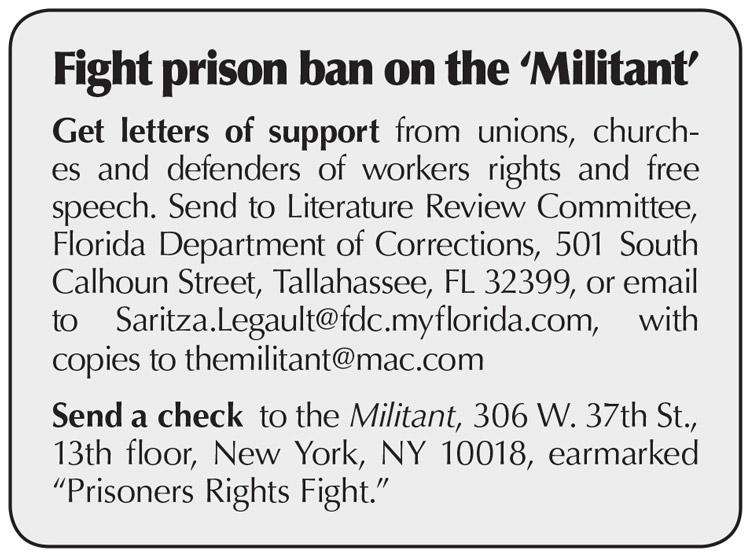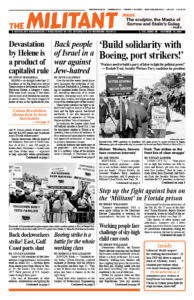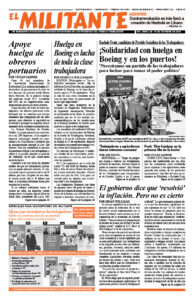“Amnesty International USA is once again calling on the Literature Review Committee to overturn the impoundment decision by Jackson Correctional Institution authorities of the Vol. 88, No. 17 issue of the Militant,” Justin Mazzola, deputy director of research, wrote on behalf of the organization in a letter sent Sept. 30.
Like dozens of other groups and individuals, Amnesty sent a letter months ago to the Florida Department of Corrections committee calling for them to reverse the ban by prison officials in Malone. This fight in defense of prisoners’ constitutional rights to read political literature of their choice and the right to freedom of the press, and for the Militant and other publications to reach their subscribers behind bars has been going on for over five months.
“We recently learned that the impoundment was upheld back on July 18,” Amnesty International’s Sept. 30 letter says, “but that the attorneys for the Militant reportedly were not informed of this decision until more than a month later on Aug. 21. The Literature Review Committee held an appeal hearing on Aug. 29, but the publication has not learned the decision of that hearing as of the date of this letter.
“We are calling on your office to expeditiously provide the publication and its attorney, David Goldstein, with the decision from its Aug. 29 appeal hearing as well as an explanation for the lack of timely notice of the decisions made at each of the hearings on this matter,” the letter said.
The Militant was informed May 17 that Jackson prison officials had banned issue no. 17 on April 29. This current issue is no. 38! They claimed an Associated Press photo showing the body of a Jewish man murdered by Hamas and being driven around Gaza City to cheers by Islamist thugs during the Nazi-like group’s Oct. 7 pogrom, “depict hatred toward a specific race.”
The picture was in a feature article reprinting the opening chapter of Pathfinder’s latest book, The Fight Against Jew-Hatred and Pogroms in the Imperialist Epoch: Stakes for the International Working Class.
Prison authorities claimed that the photo — and the whole issue — are “dangerously inflammatory,” encouraging “riot, insurrection, rebellion” and “organized prison protest.”
“This notion that it depicts hatred towards a particular group is completely unsupported by the article’s content, which does not describe, advocate, or glorify any such activities or violence,” wrote Amnesty International in its initial letter to the Literature Review Committee June 5. “In fact, the article specifically details the long fight against anti-Semitism, condemns Hamas for its Oct. 7 attacks largely against Israeli civilians, and sets it in the broader context of attacks on the Jewish community throughout history.”
“The act of informing subscribers about events of the outside world in and of itself,” wrote Mazzola, “should not be a means to violate prisoners’ freedom of expression.”
This fight has won widespread support from a broad array of organizations, from Amnesty to the Florida Press Association, urging the Review Committee to uphold the First Amendment and overturn the ban.
Related to this fight are protests by the American Civil Liberties Union, the American Booksellers Association, Prison Policy Initiative, and dozens of other organizations against restrictions prison authorities have placed on workers behind bars having access to books. They sponsored a Prison Banned Books Week at the end of September. Prison officials in Florida enforce some of the biggest restrictions on books. They banned 20,000 titles in 2022, the Marshall Project reported.
Help get more letters sent to the Literature Review Committee urging that the ban on Militant no. 17 be ended!


